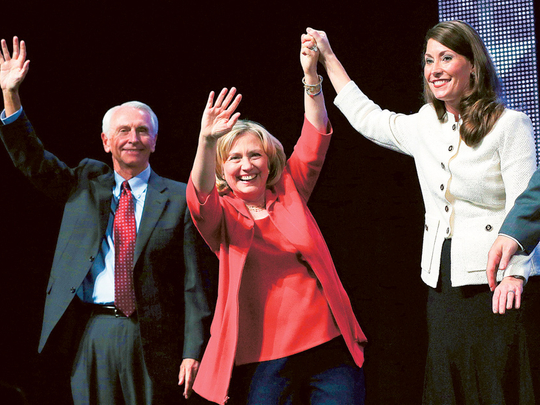
Louisville: The last time Hillary Rodham Clinton campaigned in Kentucky she was delivering her victory speech after defeating Barack Obama in the state’s 2008 Democratic presidential primary on the strength of a huge advantage among white, working-class voters. White Democrats voted for Clinton over Obama by 49 percentage points in 2008, a telling indication of both her strength and Obama’s trouble in attracting traditional Democratic voters.
When Clinton returned here Wednesday to campaign for the Senate candidate Alison Lundergan Grimes, a family friend, it was that appeal that Kentucky Democrats hoped would give Grimes a needed boost in her underdog campaign against Sen. Mitch McConnell. The demand for Clinton — she has already been asked back to campaign again for Grimes — only underscores the racial and class divisions in the Democratic Party that emerged in 2008 and were exacerbated during Obama’s presidency, and which Clinton would need to bridge if she runs for president again in 2016.
Obama is so unpopular in Kentucky that Grimes will not even say whether she voted for him. In a debate Monday evening, Grimes cited “privacy at the ballot box” when asked again about it, although she has freely acknowledged voting for Clinton in 2008 and at Wednesday’s rally called Kentucky “Clinton country.”
Many Democrats said Obama never made efforts to repair the divides that became apparent that year, leaving states like Kentucky and Arkansas vulnerable to a Republican rout.
“I think if Hillary Clinton were in the White House today, McConnell would be behind by 20 points,” said Todd Hollenbach Sr., a former Jefferson County judge executive whom McConnell unseated in 1977.
But after four years serving as secretary of state in the Obama administration and nearly two years living in New York with a packed schedule of paid speeches, book signings and charity galas, Clinton will need to reintroduce herself to the blue-collar voters here and elsewhere who have become further alienated from the Democratic Party during the Obama administration.
“I will never forget the time I spent criss-crossing the state in 2008 and all of the determined, hardworking people I met along the way,” Clinton said.
“I’m back,” she added.
Besides Wednesday night’s speech, Clinton will talk about middle-class jobs Thursday in Michigan at campaign events for two Democrats, Rep. Gary Peters and former Rep. Mark Schauer. Before the midterm election, Clinton will also campaign in Georgia for Michelle Nunn, the Democratic nominee for Senate, and in New Hampshire for Sen. Jeanne Shaheen and Gov. Maggie Hassan.
“When she speaks about issues of economic opportunity, particularly when she speaks about economic opportunity for women and for families, she does it in a way that really connects,” said Mo Elleithee, the national communications director at the Democratic National Committee who worked on Clinton’s 2008 campaign.
That message helped Clinton defeat Obama here by 35.6 percentage points in the state’s 2008 primary; only in Arkansas did she win a wider margin of white voters. By then, Obama had already won the delegates necessary to effectively secure the nomination, but in her victory speech in Louisville, Clinton vowed to stay in the race until Democrats had a nominee, “whoever she may be.”
In the past six years, this state like much of the country has become more politically polarised. At the same time, fond memories of the Clinton administration — many of the voters who supported Hillary Clinton did so because of their affection for Bill Clinton, who carried Kentucky in 1992 and 1996 — have faded.
Kentucky voters identified with Bill Clinton because of his rural Arkansas roots and centrist politics. Hillary Clinton largely resonated here because of “the Bill factor,” said Al Cross, director of the Institute for Rural Journalism and Community Issues at the University of Kentucky. “It’s been awhile, so she does need to reintroduce herself,” Cross added.
Jonathan Miller, a former Kentucky state treasurer, said it was voters’ animosity toward Obama, and not necessarily excitement for Hillary Clinton, that was energising Democrats here. “We’re just nostalgic for when Democrats were different than Obama,” he said.
Kentucky Republicans have tried to remind voters that Clinton worked in the Obama administration and cannot easily escape association with the unpopular president.












